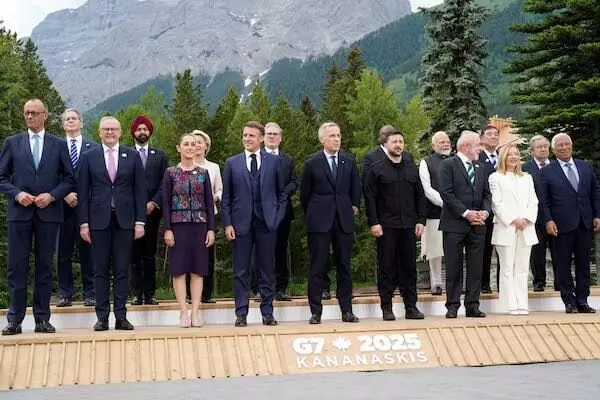India’s New Diplomatic Assertiveness: A Strategic Message to the World

Prime Minister Narendra Modi’s recent diplomatic maneuvers—his invitation to the G7, the polite refusal of President Donald Trump’s invitation, and landmark visits to Cyprus and Croatia—are more than routine statecraft. They reflect a nuanced, assertive, and increasingly self-confident Indian foreign policy, signaling India’s priorities and its evolving place in the global order.
India and the G7: An Invitation That Speaks Volumes
India is not a member of the G7, the exclusive club of the world’s most advanced economies, but this year marked the 12th time India has been invited to participate, and Modi’s sixth consecutive invitation. The G7 summits have become a stage for India to showcase its growing economic clout and diplomatic relevance. This year’s summit, hosted by Italy, saw India included alongside other major emerging economies, reflecting the G7’s recognition of India’s role in global issues such as inclusive development, climate action, and geopolitical stability.
The invitation also came at a sensitive juncture in India-Canada relations. After a period of diplomatic chill over the killing of pro-Khalistani separatist Hardeep Singh Nijjar and reciprocal expulsion of diplomats, the G7 provided an opportunity for both countries to signal their intent to repair ties. Yet, for the first time in six years, Modi was unlikely to attend the G7 summit in Canada, a decision shaped by unresolved concerns about Ottawa’s stance on Khalistani separatists and the potential for disruptions. This absence, while notable, was not a snub but a calculated decision reflecting India’s unwillingness to participate in high-profile events unless its core concerns are addressed.
A Polite, Strategic Refusal to President Trump
Perhaps the most telling moment came when PM Modi declined President Donald Trump’s invitation for a stopover in Washington, D.C., on his return journey from Canada. Modi’s reason was straightforward: he had prior commitments in Odisha, specifically a visit to the sacred land of Lord Jagannath, coinciding with the anniversary of the BJP government in the state.
This polite refusal was more than a matter of scheduling. It was a subtle assertion of India’s priorities. Modi’s gesture conveyed that India, under his leadership, is no longer a nation eager for validation from global powers. Instead, it is a confident actor, willing to engage on its own terms. This message was reinforced by Modi’s reiteration to Trump that India has never accepted—and never will accept—third-party mediation on bilateral issues such as Kashmir, emphasizing India’s sovereignty and strategic autonomy.
The refusal also had domestic resonance. By prioritizing a visit to Odisha over a high-profile dinner in Washington, Modi sent a signal to his domestic audience about his commitment to India’s internal development and cultural heritage, reinforcing his image as a leader rooted in Indian values even while navigating global corridors of power.
The Cyprus Visit: A Signal to Turkey and the EU
Modi’s visit to Cyprus was the first by an Indian Prime Minister in over two decades, and it was laden with strategic undertones. Cyprus, a member of the European Union but geographically close to Turkey and Syria, has been at the heart of regional tensions, especially given Turkey’s deepening ties with Pakistan—an issue of concern for India.
During his visit, Modi held talks with President Nikos Christodoulides and addressed business leaders, reaffirming India’s commitment to deepening bilateral ties and strengthening engagement with the Mediterranean region and the EU. Cyprus has been a vocal supporter of India on issues like cross-border terrorism, and the visit came at a time when Cyprus is set to assume the Presidency of the Council of the EU in 2026.
Strategically, the visit was a subtle message to Turkey, signaling India’s willingness to expand its influence in Turkey’s neighborhood and build partnerships with countries that share its concerns about terrorism and regional stability.
Historic First: Modi in Croatia
Modi’s tour concluded with a historic first-ever visit by an Indian Prime Minister to Croatia since diplomatic ties were established in 1992. Croatia, though small, holds strategic significance for India due to its geographic position in the Balkans and its growing role within the European Union.
The visit underscored the deep civilizational connections between India and Croatia and highlighted Croatia’s importance in India’s broader European strategy. By engaging with Croatia, India is diversifying its European partnerships beyond the traditional power centers, seeking new avenues for cooperation in trade, technology, and culture.
A New Template for Indian Diplomacy
Taken together, these moves reflect a new template for Indian diplomacy. India demonstrates assertive sovereignty through Modi’s refusal to accept third-party mediation and his prioritization of domestic commitments over international optics. The choice of Cyprus and Croatia as destinations signals strategic engagement, showing a willingness to work with smaller but strategically important nations while expanding India’s diplomatic footprint.
India’s approach to the G7—participating when it aligns with national interests, abstaining when concerns persist—shows selective multilateralism and a mature, interest-driven approach. Modi’s actions demonstrate an ability to balance global and domestic priorities, managing the demands of global leadership alongside the imperatives of domestic politics and cultural identity.
Conclusion: India on Its Own Terms
Prime Minister Modi’s recent diplomatic choices are not just about travel itineraries or protocol. They are a reflection of a larger shift: India’s emergence as a self-assured power, willing to engage the world on its own terms, assert its interests unapologetically, and project its values confidently. Whether at the G7 table, in conversations with global leaders, or in forging new partnerships in Europe, India is signaling that it is ready to shape, not just follow, the global agenda. This is the new normal in Indian diplomacy—strategic, self-assured, and steadfastly sovereign.
